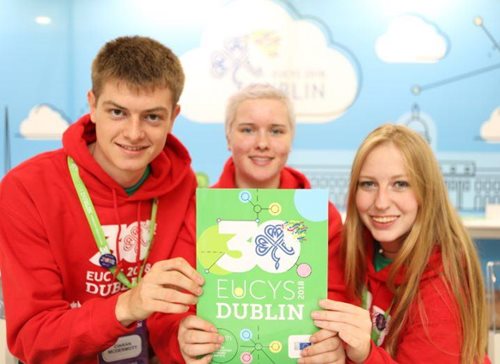 Students participating in EUCYS 2018. Image: Luke Maxwell
Students participating in EUCYS 2018. Image: Luke Maxwell
Projects from Germany and Canada were awarded top prizes today (18 September) at the EU Contest for Young Scientists (EUCYS) closing ceremony in Dublin Castle.
Sibling duo Adrian (20) and Anna Amelie (16) Fleck, hailing from Germany, were honoured for their project entitled ‘FleckProtec – body protection made from starch’. The liquid, designed to protect athletes from injury, turns into an ultra-flexible solid, which provides protection without compromising much-needed freedom of movement.
Brendon Matusch (15) was one of two people from Canada to also receive a top prize. He developed an autonomous vehicle controlled by neural networks in order to investigate software strategies that are “reliable, safe and efficient”.
Finally, Nicolas Fedrigo (17), also from Canada, was awarded a top prize for his project. Fedrigo endeavoured to make spinal fusion surgery safer by redesigning the tool used to direct the placement of the screws during the procedure. The misplacement of the screws is both prevalent and dangerous – 29pc of procedures result in accidental damage due to it, and this damage can often result in paralysis.
Projects from France, Estonia, Portugal, Georgia, South Korea and China received second- and third-place prizes.
“I warmly congratulate the winners of this year’s contest on their fantastic achievement,” said Carlos Moedas, European Commissioner for research, science and innovation. “It’s encouraging to see so much talent in these young researchers and innovators. They are Europe’s future – with their groundbreaking discoveries and innovations that are no doubt to come, we will be able to better tackle the great challenges and ensure Europe’s prosperity and wellbeing.”
Ireland was represented at the event by Simon Meehan (17). His investigation into the antimicrobial effects of an array of plants against the bacterium that causes MRSA, golden staph (Staphylococcus aureus), wowed judges at the BT Young Scientist and Technology Exhibition 2018. For his efforts, Meehan was awarded the Expo Sciences Luxembourg prize.
The Irish Research Council also presented an award to South Korea’s Dahyeon Choi for excellence in interdisciplinary research. Her project, entitled ‘Development of an interactive and dynamic artificial intelligence storytelling system based on neural conversation models and speech recognition’, investigated the learning benefits of AI-powered interactive storytelling for children.
EUCYS 2018 saw a total of 139 students from 38 countries take part, with a total of 90 projects showcased in the RDS Arena in the hopes of being awarded the coveted overall prize. All EUCYS participants previously won the national science competition in their respective home countries.
Eva Short
This article first appeared on www.siliconrepublic.com and can be found at:
https://www.siliconrepublic.com/innovation/eucys-2018-winners



